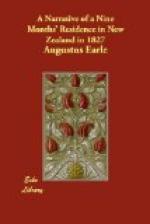After some consultation among their leading men upon the subject of our message, King George presented himself at the door of our hut, and, in the most humble manner, surrendered his musket; and shortly after his brother Kiney Kiney did the same. Thus we gained our point, and received both payment and apologies for their violent behaviour. Friendship being thus restored, we soon gave them back their muskets, to their infinite surprise and satisfaction.
On reflection, I felt quite convinced that the natives liked us the better for what we had done: it afforded them also a lesson of humanity, for they all well knew we had no other object in view when we stood forward to defend the poor fellow, who had relied upon our promise of protecting him. Several chiefs told us that they greatly admired our principles, and should always feel themselves quite safe with men like us, who would risk their own lives rather than break their word, or desert a friend in the hour of danger.
At the close of this eventful day we received another token of peace, which was in its manner simple and affecting, and not such as could have been expected from a nation of savages. A procession of young girls approached our door, each bearing a basket: some were filled with nicely cooked potatoes, others with various fruits and flowers, which they set down before us, chanting, in a low voice, a song in praise of our recent exploit; a man bearing a very large fish closed the procession; he repeated the song also. We were informed that these presents had been sent by King George as a ratification of friendship, for the New Zealanders never think a reconciliation perfected till you have again eaten and drank with them.
Two important conclusions may be drawn from the termination of this affair: first, that if a spirited interference takes place on the part of the Europeans, murder may be at times prevented, as we actually rescued a mortal foe from the vengeance of an exasperated enemy; and, secondly, their efforts to restore amity proves their extreme desire to have white people settle amongst them.
About a week after this event we witnessed a most extraordinary ceremony, which partook more of the ludicrous than the horrible, though I have no doubt it was regarded by the natives as a most solemn affair. For some days we had been honoured by the presence of a great priest, or one of their chief tabooers; he came for the purpose of discussing with the chiefs the affairs of the nation, particularly the approaching war with the tribe of the Thames; and the day set apart for the discussion of the principal points was ushered in by a rich feast, not of pork nor fish, nor even the kumara, but of two old, sturdy, large dogs!




